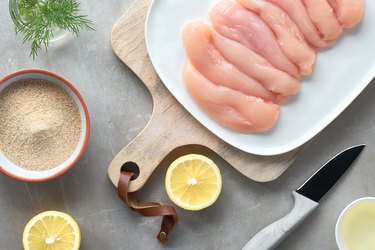
It's such a pleasure to come home after a day's work and know that a warm, appetizing meal is waiting for you. Slow-cooker chicken tenders are a nutritious main dish that only require a little preparation.
Tip
One way of making Crock-Pot chicken tenderloins is to wrap them in corn husks, add broth and cook on low for four to six hours.
Video of the Day
Chicken Tenderloins in Crock-Pot
Chef Thomas Odermatt of Butcher's by Roli Roti shares his method of making slow-cooker chicken tenders with LIVESTRONG.com. "Cooking your chicken inside of corn husks will infuse it with a nice natural nutty corn taste, and the bone broth will add extra nutrients and savoriness," he says. This recipe allows for hours of flavor development without worrying about burning the husks or drying out the chicken.
Video of the Day
"Flavorful, but not overpowering, these chicken tenderloins can be enjoyed alone or served with a simple sauce or gravy," Odermatt adds. They make a good accompaniment for vegetables or grains.
Things You'll Need
2 pounds of boneless and skinless chicken tenderloins
Salt and pepper
Cayenne pepper (optional)
Two to four dried corn husks
1 1/2 cups of chicken stock or bone broth
Directions:
- Season chicken tenderloins with salt and pepper, and add cayenne if extra spiciness is desired.
- Place the chicken tenderloins inside the corn husks (one per husk). Tie each one off with butcher's twine every inch, all the way down the husk, until the tenderloin is tightly inside the husk.
- Once tightly secured, place the wrapped husks in the slow cooker and add the chicken broth.
- Cover the slow cooker and cook on high for two to three hours or on low for four to six hours until the chicken is fully cooked.
- Once done, remove the chicken and husks from the slow cooker and carefully remove the tenderloins from the husk.
Boneless, skinless chicken breasts may be used instead of chicken tenderloins or tenders. This can change the nutrition profile slightly.
Advantages of Using Slow Cookers
Slow cookers are electrical appliances that cook food slowly at a temperature that usually ranges from 170 to 280 degrees Fahrenheit, notes the U.S. Department of Agriculture (USDA). The long cooking time helps tenderize inexpensive cuts of meat and destroys bacteria that can cause food poisoning, which makes this a safe option for meal preparation.
In addition, slow cookers offer great convenience and versatility. They're ideal for cooking high-moisture dishes such as soups, stews, casseroles and chili, all of which are more nutritious and less costly than takeout food.
Many meals may be started quickly in the morning by taking a few minutes to chop ingredients and throw them into the pot. This small investment of time and effort is very worthwhile as it allows you to have dinner ready for your family in the evening.
It's also possible that slow cookers may save you a bit on your power bill. They use less electricity than an oven.
Read more: 10 Simple and Delicious Slow Cooker Meals
Slow-Cooker Safety Tips
Keep perishable foods in the refrigerator until you're ready to use them. Store chopped raw vegetables and meat separately in the refrigerator.
Thaw meat before putting it in a slow cooker. According to the USDA, if you put frozen poultry in the pot, bacteria can grow during the lengthy time it requires to thaw. Using defrosted foods ensures that the meat cooks thoroughly.
To retain the heat after putting the ingredients into the pot, cover and then only remove the lid to stir, advocates the Academy for Nutrition and Dietetics. If you're going to be at home, it's a good idea to cook on a high setting for the first hour and then lower the heat to the setting in your recipe. On the other hand, if you're leaving for work, you can safely use low heat for the entire cooking time.
Put leftovers in the refrigerator within two hours after the cooking is finished. Reheat food in the oven or on the stove until it reaches 165 F. Afterward the hot food can be put in a preheated slow cooker to keep it warm.
Keep the food hot while waiting to serve. The food temperature should be maintained at a minimum of 140 F.
- United States Department of Agriculture Food Safety and Inspection Service: "Slow Cookers and Food Safety"
- U.S. Department of Agriculture: "Cook Slow to Save Time: Four Important Slow Cooker Food Safety Tips"
- Butcher's by Roli Roti: "Homepage"
- Butcher's by Roli Roti: "About Thomas Odermatt"
- Academy of Nutrition and Dietetics: "10 Food Safety Tips for the Slow Cooker"